Fired Up. Ready to Go.
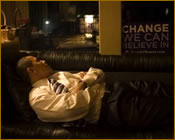 By the time this essay is published, most people in the United States will be fast asleep. No doubt there will be exceptions: some journalists and campaign staffers will work through the night. Perhaps President Obama will sit in the darkness of his hotel suite with the radio and television switched off while he sips a cup of coffee; I imagine that he is the kind of person who enjoys silence from time to time. Presidential campaigns have a notable lack of this: there are so many raucous crowds, so many questions to answer, so many loud ringtones and clicks of cameras, so much dramatic music, so many engines running. It must be a luxury for him to have a moment alone with his thoughts and to partake of a simple cup of java, with its rich scent and steam rising off its dark surface. If he cares to look out the window, he will probably be able to track the progress of the night. The orange sodium lamps and neon lights of the city will drown out much of the starlight. Nevertheless, a few bright specks in the sky will likely be visible, as will the moon. The earth will do one more complete spin on its axis; by the time he sees the moon and stars again, he will certainly know his destiny, and that of the country.
By the time this essay is published, most people in the United States will be fast asleep. No doubt there will be exceptions: some journalists and campaign staffers will work through the night. Perhaps President Obama will sit in the darkness of his hotel suite with the radio and television switched off while he sips a cup of coffee; I imagine that he is the kind of person who enjoys silence from time to time. Presidential campaigns have a notable lack of this: there are so many raucous crowds, so many questions to answer, so many loud ringtones and clicks of cameras, so much dramatic music, so many engines running. It must be a luxury for him to have a moment alone with his thoughts and to partake of a simple cup of java, with its rich scent and steam rising off its dark surface. If he cares to look out the window, he will probably be able to track the progress of the night. The orange sodium lamps and neon lights of the city will drown out much of the starlight. Nevertheless, a few bright specks in the sky will likely be visible, as will the moon. The earth will do one more complete spin on its axis; by the time he sees the moon and stars again, he will certainly know his destiny, and that of the country.
For most, however, sleep will prevail. Farmers in Iowa will snooze in their oak frame beds and cuddle their spouses in order to fend off the bitter November chill. Single city dwellers in New York and Los Angeles will sleep with their arms and legs splayed askew across the battlefield of the mattress. Newly minted Marines, their heads still itching from recent crew cuts, will lay in their bunks, and slumber will bring to them visions of home. Fathers, sons, mothers, and daughters will all be locked into dreams, the one place which seems eternally safe from modern life’s incessant din.
Meanwhile, the first rays of dawn will touch the hills surrounding Bradford and the morning news will be full of last minute analyses. Certainly, the studios in London are being prepared, the pots of coffee set up, and the computers are being readied to collect and analyse the streams of data washing in from across the Atlantic. When the polls open, there will be British and other news cameras on the scene, ready to beam out the first pictures of America making its choice. In my mind’s eye I can see a befuddled, elderly gentleman in a blue parka going to vote and wondering why everyone is making such a fuss.
The markets in London, Frankfurt and Paris will hold their breath and hedge their bets; I can envisage a trader in a white shirt with the collar open and a loosened maroon tie, casting a wide-eyed gaze at a big screen filled with CNN. If Romney wins, he reasons, then investment banks should do well. After all, they were among the largest contributors to his campaign. Obama, in contrast, received a great deal of support from technology companies. Goldman Sachs or Google? Wait, the trader may think, hold back. We will know more soon: but in the meantime, all eyes will remain fixed on America, as if examining the process of voting will somehow reveal the result prior to its actual arrival. Indeed, many will check the internet to see when polls open; come on, come on, let’s start, they think, because the sooner we begin, the sooner we will get it over with. The frustration will boil over: any American expatriate who dares venture into the open will be questioned intently, “What’s going to happen?”
Though I’m now probably more British than American, this is a particularly tense time for me. I recall the last Presidential election: I was living in West Sussex at the time. On that day, I wore an Obama ’08 shirt with a blue cardigan and a “Hope” pin fixed to the lapel. I was busy. I had to go to a seminar on how to best pursue a career in higher education. The convenor, a tall man with thinning brown hair who wore a thick sand-coloured sweater, said to me, “I see where your allegiance lies…I’m afraid as an educator, I have to be impartial.”
He smiled: it was a toothy yet sincere grin. “But,” he continued, “go Obama!”
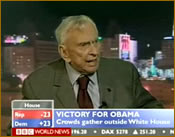 I was alone that night; I lay on my bed as the results came in, my head propped up on three pillows, as if positioning myself to face the television in this way would be enough to keep me awake. This was overly optimistic: as the BBC droned on, urging patience as they were awaiting the results, I fell asleep. This was to my regret, as I understand the famed novelist Gore Vidal had a hilarious outburst while being questioned by David Dimbleby. It is perhaps the privilege of the esteemed to not be taken too seriously at the right time. In Vidal’s case, he plainly had no idea who Dimbleby was, and furthermore, didn’t care; the response to his befuddlement was well intentioned laughter.
I was alone that night; I lay on my bed as the results came in, my head propped up on three pillows, as if positioning myself to face the television in this way would be enough to keep me awake. This was overly optimistic: as the BBC droned on, urging patience as they were awaiting the results, I fell asleep. This was to my regret, as I understand the famed novelist Gore Vidal had a hilarious outburst while being questioned by David Dimbleby. It is perhaps the privilege of the esteemed to not be taken too seriously at the right time. In Vidal’s case, he plainly had no idea who Dimbleby was, and furthermore, didn’t care; the response to his befuddlement was well intentioned laughter.
I finally awoke when I heard the sound of a crowd cheering. I rubbed my eyes and looked at the screen: a vast throng had assembled in a Chicago park, the rolling headline at the bottom of the picture indicated that Obama’s victory had been overwhelming. As President-elect Obama strode up to the podium, seeming chastened as well as triumphant, I was quietly hopeful. After his simple, heartfelt speech, I again fell asleep.
The earth has travelled around the sun four times since then and most of us are different people to what we were to a lesser or greater extent; I have fewer hairs on my head and more of what I do possess is grey. I’ve moved to Yorkshire, a place which suits me far better than Sussex ever did. My current work environment is more businesslike: the blue cardigan and Obama t-shirt will remain tucked away in my dresser drawer. The “Hope” pin, however, may make it to my coat’s lapel. My optimism has faded, hope and belief weren’t sufficient in and of themselves to override fully Washington’s backstabbing, dirty dealing and out and out stonewalling. But a lack of forward momentum isn’t sufficient to make me wish for America to press “Rewind”.
We have had four years and four trips around the sun, and while much remains to be done, at least there have been some improvements. For all its faults, access to health care has been expanded. Some vital industries and jobs have been saved. America is no longer seen purely as a nation of insensitive buffoons; Russia’s boneheaded support for the Assad regime is neatly aligning it for the bogeyman role. The American economy is growing at a faster clip than in most developed nations; unemployment, at long last, is headed in the right direction. While Hurricane Sandy was a disaster, at least the recovery efforts are far more competently managed now than they were when Hurricane Katrina struck. Things are better and better should never be seen as the enemy of the good. Yes, it’s not quite the gilded “Yes We Can” romance of four years ago: but to echo another one of the key catch phrases of 2008, I’m still “fired up” and “ready to go”.
Daybreak approaches. The clock radio will sound, echoing with the weather forecast and carrying with it the necessities and obligations of the morning. I will get up, make the coffee, take care of my cats. The dark skies will fade from black to dark blue and then arrange into a pattern for sunrise. America will still be asleep; but no matter what else I do, my day will swing in its orbit. I will keep a news feed on in the background. I will go home. Night will fall. I will perhaps bake a pepperoni pizza I bought at the local supermarket and drink a fine Yorkshire ale. The last voters will file in and out of voting booths across America; my parents in New York may be among them. They may step into the booth, draw the curtains, flick the metal switches beside the names of the candidates they want. Once done, they will each pull a lever to record their selection, simultaneously causing the fabric shroud around them to slide open. Then the polls will close. The results will be tallied; as the moon and stars cast their light down on both sides of the Atlantic, eventually, we will find out what has been decided. Perhaps one compulsion unites so many, American and overseas, Republican and Democrat, President Obama and Mitt Romney: we anticipate this moment to the point we cast ourselves into it in our thoughts. It will come, and while it may not be what we imagine, it retains the possibility of being more than we hoped.

 Climate change is no longer a theory. I grew up in a New York suburb which is prim, proper and thoroughly bourgeois: it’s a place that features tidy suburban houses, neatly trimmed lawns and American flags fluttering proudly. While the weather could be wild, I don’t recall it being extreme. I remember one particular rainstorm; I was thirteen years old. I was walking home from school when it began. It was spring, so the torrent let loose the scents of fresh earth and new grass. Trees swayed in the wind, their leaves rustled. The raindrops were huge and soaked me to the skin: my footsteps turned into a run the moment the lightning flashed and the thunder sounded. I ran to my front door, I fumbled with my keys for a few moments before I was able to get in. Fortunately, no one else was home to see me in such a state; I remember how the thunder resounded after I shut the door. It was as if the storm was gloating; it was a powerful reminder that human beings are trivial creatures, and should Mother Nature choose, she could easily flick us off her back.
Climate change is no longer a theory. I grew up in a New York suburb which is prim, proper and thoroughly bourgeois: it’s a place that features tidy suburban houses, neatly trimmed lawns and American flags fluttering proudly. While the weather could be wild, I don’t recall it being extreme. I remember one particular rainstorm; I was thirteen years old. I was walking home from school when it began. It was spring, so the torrent let loose the scents of fresh earth and new grass. Trees swayed in the wind, their leaves rustled. The raindrops were huge and soaked me to the skin: my footsteps turned into a run the moment the lightning flashed and the thunder sounded. I ran to my front door, I fumbled with my keys for a few moments before I was able to get in. Fortunately, no one else was home to see me in such a state; I remember how the thunder resounded after I shut the door. It was as if the storm was gloating; it was a powerful reminder that human beings are trivial creatures, and should Mother Nature choose, she could easily flick us off her back.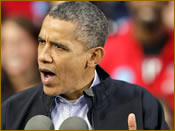 The candidates have to put on their polished shoes, their shirts which thankfully they can now leave open at the neck, their windbreakers which hide sagging shoulders. I suspect they have to pop more than a few throat lozenges in their mouths before daring to speak. Sleep has probably long been submerged in seas of bad coffee or in Mitt Romney’s case, tap water and orange juice. Were I either of them, I’d look at the clock’s advances along time’s path with relief. In the case of President Obama, this is the last election he is likely to fight: while it’s true that he could run for another elected office again regardless of the outcome, the last former occupant of the White House to do so was John Quincy Adams. As for Mitt Romney, this is possibly his last shot at the Presidency; Paddy Power has already paid out the punters in anticipation of his defeat. Election night, win or lose, will bring deliverance from heated rhetoric and anticipation. The wider world can then settle into recovery mode in time for Christmas.
The candidates have to put on their polished shoes, their shirts which thankfully they can now leave open at the neck, their windbreakers which hide sagging shoulders. I suspect they have to pop more than a few throat lozenges in their mouths before daring to speak. Sleep has probably long been submerged in seas of bad coffee or in Mitt Romney’s case, tap water and orange juice. Were I either of them, I’d look at the clock’s advances along time’s path with relief. In the case of President Obama, this is the last election he is likely to fight: while it’s true that he could run for another elected office again regardless of the outcome, the last former occupant of the White House to do so was John Quincy Adams. As for Mitt Romney, this is possibly his last shot at the Presidency; Paddy Power has already paid out the punters in anticipation of his defeat. Election night, win or lose, will bring deliverance from heated rhetoric and anticipation. The wider world can then settle into recovery mode in time for Christmas.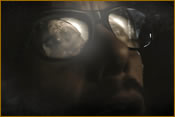 Halloween offers few forms of entertainment for the middle aged. If one has friends who are throwing a party in the vicinity, then it’s probably best to put on a smudge of face paint, don a white smock with an anonymous red stain, and go. The evening can then be spent in good company while swilling bad Chardonnay as “The Monster Mash” plays in the background. If there aren’t any such festivities on offer, one can stay at home and await the inevitable knocks on the door followed by plaintive pleas for free candy from diminutive ghosts and skeletons. Alternatively, one can go out and see a scary film. Despite the intermittent rain which prevailed over Yorkshire last night, the last option proved to be the most attractive.
Halloween offers few forms of entertainment for the middle aged. If one has friends who are throwing a party in the vicinity, then it’s probably best to put on a smudge of face paint, don a white smock with an anonymous red stain, and go. The evening can then be spent in good company while swilling bad Chardonnay as “The Monster Mash” plays in the background. If there aren’t any such festivities on offer, one can stay at home and await the inevitable knocks on the door followed by plaintive pleas for free candy from diminutive ghosts and skeletons. Alternatively, one can go out and see a scary film. Despite the intermittent rain which prevailed over Yorkshire last night, the last option proved to be the most attractive.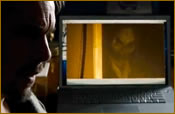 “Sinister” could have gone a number of different routes; the explanation provided for the murders is supernatural in nature. We are introduced to a malevolent entity later referred to as “Bughuul”, or as he’s called by some of the children involved, “Mr. Boogie”. This supernatural route borrows heavily from some horror classics: the use of visual media as a means of conveying horror is reminiscent of both the “Blair Witch Project” and the “Ring” series. The entity’s preoccupation with children echoes “Pennywise the Clown” in Stephen King’s “It”. The idea of the young as manipulated instruments of evil echoes “The Children of the Corn”. As the producer of “Sinister” was also responsible for “Paranormal Activity”, there is an unsurprising, though effective use of sudden appearances of people and things, as well as useful doses of bumps in the night. People in the audience gasped and cried out in terror at just the right moments; I was among them. However, there is nothing new here; it is just a well crafted remix.
“Sinister” could have gone a number of different routes; the explanation provided for the murders is supernatural in nature. We are introduced to a malevolent entity later referred to as “Bughuul”, or as he’s called by some of the children involved, “Mr. Boogie”. This supernatural route borrows heavily from some horror classics: the use of visual media as a means of conveying horror is reminiscent of both the “Blair Witch Project” and the “Ring” series. The entity’s preoccupation with children echoes “Pennywise the Clown” in Stephen King’s “It”. The idea of the young as manipulated instruments of evil echoes “The Children of the Corn”. As the producer of “Sinister” was also responsible for “Paranormal Activity”, there is an unsurprising, though effective use of sudden appearances of people and things, as well as useful doses of bumps in the night. People in the audience gasped and cried out in terror at just the right moments; I was among them. However, there is nothing new here; it is just a well crafted remix.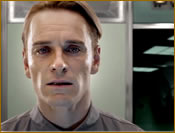 If the discovery of the “Engineers” is a disappointment, it is more than made up for by the performance of Michael Fassbender as “David”, an android. Fassbender apparently ignored Ian Holm’s performance as the android “Ash” in the original “Alien”, and that of Lance Henricksen as “Bishop” in “Aliens”. Rather, he apparently focused his studies on the replicants in “Blade Runner” and Hal in “2001: A Space Odyssey”; as David is a predecessor to Ash and Bishop, this was perhaps wise. An android constructed now would no doubt be subject to these cultural influences, even on a subconscious level. Additionally, Fassbender plays David with perfect ambiguity: is he more machine than man, what precisely does he feel, does he have anything which could be called a moral compass? David’s “inner life” is difficult to fathom and thus the questions are never fully answered: his own creator says that David doesn’t have a soul, yet he has human preoccupations. For example, enjoys films like David Lean’s “Lawrence of Arabia”, even modelling his hair style after that of Peter O’Toole. Also, in a disturbing, somewhat Freudian exchange, he states that he wishes his creator was dead. The viewer can’t help but have mixed feelings about him; however the paradoxes presented by his character perhaps leads one to understand why the “Engineers” would have a less than wholesome view of humanity. An unpredictable creation may be something to be feared.
If the discovery of the “Engineers” is a disappointment, it is more than made up for by the performance of Michael Fassbender as “David”, an android. Fassbender apparently ignored Ian Holm’s performance as the android “Ash” in the original “Alien”, and that of Lance Henricksen as “Bishop” in “Aliens”. Rather, he apparently focused his studies on the replicants in “Blade Runner” and Hal in “2001: A Space Odyssey”; as David is a predecessor to Ash and Bishop, this was perhaps wise. An android constructed now would no doubt be subject to these cultural influences, even on a subconscious level. Additionally, Fassbender plays David with perfect ambiguity: is he more machine than man, what precisely does he feel, does he have anything which could be called a moral compass? David’s “inner life” is difficult to fathom and thus the questions are never fully answered: his own creator says that David doesn’t have a soul, yet he has human preoccupations. For example, enjoys films like David Lean’s “Lawrence of Arabia”, even modelling his hair style after that of Peter O’Toole. Also, in a disturbing, somewhat Freudian exchange, he states that he wishes his creator was dead. The viewer can’t help but have mixed feelings about him; however the paradoxes presented by his character perhaps leads one to understand why the “Engineers” would have a less than wholesome view of humanity. An unpredictable creation may be something to be feared. Prior to his ascent to the throne, the Roman Emperor Claudius was continually underestimated. He had a club foot, a stammer, was prone to nervous fits and was frequently ill; many of his contemporaries dismissed him as a buffoon, maligned and deformed by nature. The causes of his indisposition are unclear: historians have suggested that he suffered from polio, or perhaps Tourette’s or Aspergers. It’s rare, however, that such infirmity has been so beneficial: his nephew, the Emperor Caligula, habitually murdered anyone he perceived as a threat. Claudius was seen as harmless, and indeed, Caligula found him amusing. However, after Rome tired of Caligula’s pestilential and spendthrift reign and the Praetorian Guard, the Emperor’s own protection squad, assassinated the lunatic ruler, Claudius was made Emperor. Apparently freed from the shackles of being considered a fool, his condition improved, and he was one of Rome’s more effective rulers.
Prior to his ascent to the throne, the Roman Emperor Claudius was continually underestimated. He had a club foot, a stammer, was prone to nervous fits and was frequently ill; many of his contemporaries dismissed him as a buffoon, maligned and deformed by nature. The causes of his indisposition are unclear: historians have suggested that he suffered from polio, or perhaps Tourette’s or Aspergers. It’s rare, however, that such infirmity has been so beneficial: his nephew, the Emperor Caligula, habitually murdered anyone he perceived as a threat. Claudius was seen as harmless, and indeed, Caligula found him amusing. However, after Rome tired of Caligula’s pestilential and spendthrift reign and the Praetorian Guard, the Emperor’s own protection squad, assassinated the lunatic ruler, Claudius was made Emperor. Apparently freed from the shackles of being considered a fool, his condition improved, and he was one of Rome’s more effective rulers.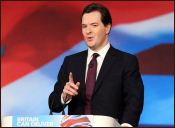 The Tory conference not only provided echoes of one of Ancient Rome’s darkest chapters, but resounded with mendacity of its own making. On Monday, the anniversary of the death of Clement Attlee, the Prime Minister who created Britain’s modern welfare state, George Osborne stated that there would need to be £10 billion more of cuts to the welfare budget. This is in spite of the fact that
The Tory conference not only provided echoes of one of Ancient Rome’s darkest chapters, but resounded with mendacity of its own making. On Monday, the anniversary of the death of Clement Attlee, the Prime Minister who created Britain’s modern welfare state, George Osborne stated that there would need to be £10 billion more of cuts to the welfare budget. This is in spite of the fact that  Nevertheless, the world keeps turning. I felt as if I was sitting in a pleasant attic of an old home, with much to delight and fascinate around me. For example, on Saturday, I went to St. Margaret’s Church in Wythop, and photographed its exterior and interior: it was pristine and resplendent both in and out, a relic which had last been retouched in the 1920’s. The winds picked up as the sun set, and I returned to the cottage just after dark.
Nevertheless, the world keeps turning. I felt as if I was sitting in a pleasant attic of an old home, with much to delight and fascinate around me. For example, on Saturday, I went to St. Margaret’s Church in Wythop, and photographed its exterior and interior: it was pristine and resplendent both in and out, a relic which had last been retouched in the 1920’s. The winds picked up as the sun set, and I returned to the cottage just after dark.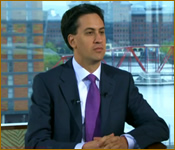 There’s also a great deal of noise from the ground floor: the Labour Party conference has just begun in Manchester. On Sunday morning television there was a gaggle of politicians from a variety of parties wearing purple ties, perhaps because purple reaches back into our historical memory. Roman Senators had a purple stripe on their togas, Emperors adorned themselves in the colour; Emperor Justinian’s wife Theodora once stated while her husband was under threat that purple made a fine funeral shroud. Or perhaps some media consultant merely told our politicians that it as a neutral colour: red says “Radical”, blue says “Reactionary”, gold says “Liberal Democrat”. The desire to find a neutral position seems to be reflected in some Labour statements; yesterday, as I wandered the Taste Cumbria stands, Twitter told me that Labour would not be reversing many of the current government’s NHS “reforms”. This morning, Ed Miliband said they were. Which is right? Well, full reversion would likely be difficult as the old structure was more or less demolished: so in essence it could be a reform on top of a reform. There is also a question of how much would be spent to achieve this and the instability that would result: would this be throwing good money after bad? Yes, no, maybe?
There’s also a great deal of noise from the ground floor: the Labour Party conference has just begun in Manchester. On Sunday morning television there was a gaggle of politicians from a variety of parties wearing purple ties, perhaps because purple reaches back into our historical memory. Roman Senators had a purple stripe on their togas, Emperors adorned themselves in the colour; Emperor Justinian’s wife Theodora once stated while her husband was under threat that purple made a fine funeral shroud. Or perhaps some media consultant merely told our politicians that it as a neutral colour: red says “Radical”, blue says “Reactionary”, gold says “Liberal Democrat”. The desire to find a neutral position seems to be reflected in some Labour statements; yesterday, as I wandered the Taste Cumbria stands, Twitter told me that Labour would not be reversing many of the current government’s NHS “reforms”. This morning, Ed Miliband said they were. Which is right? Well, full reversion would likely be difficult as the old structure was more or less demolished: so in essence it could be a reform on top of a reform. There is also a question of how much would be spent to achieve this and the instability that would result: would this be throwing good money after bad? Yes, no, maybe?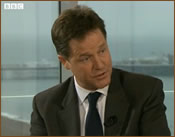 It’s very clear that Nick Clegg doesn’t watch “The Thick of It”; in the last episode, the hapless (presumably Tory) minister Peter Mannion (played with expert grumpiness by Roger Allam) is rushed back from a vacuous, cliché laden retreat to address a crisis. En route, he’s offered a selection of ties: he rejects a rainbow one, as it’s too flashy for the occasion, he then is offered a black tie, which he regards as too funereal. In the end, he prefers no tie to the wrong one.
It’s very clear that Nick Clegg doesn’t watch “The Thick of It”; in the last episode, the hapless (presumably Tory) minister Peter Mannion (played with expert grumpiness by Roger Allam) is rushed back from a vacuous, cliché laden retreat to address a crisis. En route, he’s offered a selection of ties: he rejects a rainbow one, as it’s too flashy for the occasion, he then is offered a black tie, which he regards as too funereal. In the end, he prefers no tie to the wrong one.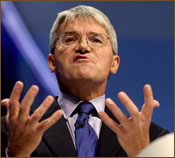 Their mask perhaps slipped in the most dramatic fashion when Andrew Mitchell, the Chief Whip, made his unguarded remarks to the police assigned to protect 10 Downing Street. Let’s put his complete loss of composure into context: he was merely told he couldn’t use a particular gate by which to exit on his bicycle. His temper taking flight might be more excusable had his bike been damaged or stolen while the police were there to watch after it; but in his case, he merely was told to use a different exit. His inexplicable response was a foul mouthed rant, during which he apparently accused the police of being “plebs” who should “know their place”.
Their mask perhaps slipped in the most dramatic fashion when Andrew Mitchell, the Chief Whip, made his unguarded remarks to the police assigned to protect 10 Downing Street. Let’s put his complete loss of composure into context: he was merely told he couldn’t use a particular gate by which to exit on his bicycle. His temper taking flight might be more excusable had his bike been damaged or stolen while the police were there to watch after it; but in his case, he merely was told to use a different exit. His inexplicable response was a foul mouthed rant, during which he apparently accused the police of being “plebs” who should “know their place”. I moved to Yorkshire in late 2011. Since that time, I’ve found much to admire: the area’s diversity, its many examples of beautiful 19th century architecture, the fine local ales and the friendliness of the people all do much to recommend it. In July, I went to Dublin and while there I attended a whiskey tasting session. The other participants and myself were asked by the guide from whence we came. It was with some pride that I replied, “Yorkshire”; my reply came from the heart. I feel something relax inside me when the signs on the M1 indicate that the next exit is for Sheffield. I know that beyond lay Wakefield, Bradford and Leeds.
I moved to Yorkshire in late 2011. Since that time, I’ve found much to admire: the area’s diversity, its many examples of beautiful 19th century architecture, the fine local ales and the friendliness of the people all do much to recommend it. In July, I went to Dublin and while there I attended a whiskey tasting session. The other participants and myself were asked by the guide from whence we came. It was with some pride that I replied, “Yorkshire”; my reply came from the heart. I feel something relax inside me when the signs on the M1 indicate that the next exit is for Sheffield. I know that beyond lay Wakefield, Bradford and Leeds.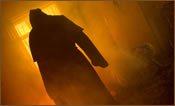 The ghost story itself is rather conventional: it is a tale of unfinished business from long ago, old scores being settled, history catching up with a present that wants to ignore it. As it seems scarcely credible that the drab little house itself is the locus which created the supernatural activity, the director (Pat Holden) wisely draws our attention to the woods behind the home. Furthermore, there are frightening scenes which utilise familiar motifs: a ghostly eye suddenly staring out of a keyhole, invisible hands grasping for victims, the unknown in the encroaching dark which is full of terrifying menace, the unseen being far more frightening than what can be viewed. It is worth mentioning that this film is not recommended for those who have a particular fear of hanging or choking.
The ghost story itself is rather conventional: it is a tale of unfinished business from long ago, old scores being settled, history catching up with a present that wants to ignore it. As it seems scarcely credible that the drab little house itself is the locus which created the supernatural activity, the director (Pat Holden) wisely draws our attention to the woods behind the home. Furthermore, there are frightening scenes which utilise familiar motifs: a ghostly eye suddenly staring out of a keyhole, invisible hands grasping for victims, the unknown in the encroaching dark which is full of terrifying menace, the unseen being far more frightening than what can be viewed. It is worth mentioning that this film is not recommended for those who have a particular fear of hanging or choking.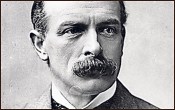 There are many reasons why we should damn Tony Blair and his minions; the nonsensical and murderous Iraq War, the now-ubquitous presence of closed circuit television in our national life, the exemption for Formula One from tobacco advertising rules, and the ever-widening separation of the Labour Party from the trade unions. However, perhaps one of the most poisonous legacies he left behind was political vacuity. With the assistance of Peter Mandelson and Alastair Campbell, he ensured words became more than a conveyance of meaning or emotion, rather, they came to be perceived as prickly as cacti, to be wrapped in the cotton wool of spin and shielded from having any particular impact that might ever be construed as negative. Our politics have suffered because of this; we no longer have the likes of Lloyd George speaking as he did in Limehouse in 1909, verbally blasting the privileged opponents of his People’s Budget to smithereens. Outside the realms of satire, we make do with the occasional clever turn of phrase or passing witticism: but to paraphrase the Bard, we jest at scars that never felt a wound. Devoid of meaning, belief in the possibilities of politics has suffered, as the voting turnout figures indicate:
There are many reasons why we should damn Tony Blair and his minions; the nonsensical and murderous Iraq War, the now-ubquitous presence of closed circuit television in our national life, the exemption for Formula One from tobacco advertising rules, and the ever-widening separation of the Labour Party from the trade unions. However, perhaps one of the most poisonous legacies he left behind was political vacuity. With the assistance of Peter Mandelson and Alastair Campbell, he ensured words became more than a conveyance of meaning or emotion, rather, they came to be perceived as prickly as cacti, to be wrapped in the cotton wool of spin and shielded from having any particular impact that might ever be construed as negative. Our politics have suffered because of this; we no longer have the likes of Lloyd George speaking as he did in Limehouse in 1909, verbally blasting the privileged opponents of his People’s Budget to smithereens. Outside the realms of satire, we make do with the occasional clever turn of phrase or passing witticism: but to paraphrase the Bard, we jest at scars that never felt a wound. Devoid of meaning, belief in the possibilities of politics has suffered, as the voting turnout figures indicate:  Autumn usually sneaks in via the back door. Its shadows lengthen on the staircase, and they take ever longer to be dispersed by the dawn. Summer’s glories fade away: the blooms on the clematis fade and die, the trees begin to change colour, shifting subtly from green to green accentuated with a touch of yellow. Longer, heavier trousers become more apropos, short sleeved shirts are relegated to the back of the closet: then one crisp morning, one steps outside to face the day. Despite the sunlight, there’s a chill and a hint of sweet rot and woodsmoke in the air. It’s at that moment that one thinks, “It’s autumn.”
Autumn usually sneaks in via the back door. Its shadows lengthen on the staircase, and they take ever longer to be dispersed by the dawn. Summer’s glories fade away: the blooms on the clematis fade and die, the trees begin to change colour, shifting subtly from green to green accentuated with a touch of yellow. Longer, heavier trousers become more apropos, short sleeved shirts are relegated to the back of the closet: then one crisp morning, one steps outside to face the day. Despite the sunlight, there’s a chill and a hint of sweet rot and woodsmoke in the air. It’s at that moment that one thinks, “It’s autumn.” We will have a brief moment of respite when Christmas arrives: some retailers are already anticipating our desire for this oasis of celebration by putting out cheap and tawdry baubles on their shelves. In contrast, yesterday I went in search of the last vestiges of the Games at the local Sainsburys. A few signs remained up, the Paralympics Agitos symbol was present in some strategic spots. But the aisles themselves had been cleansed: all accoutrements of the Games were replaced with dull “Back to School” items advertised with the mawkish motif of chalk scrawls on blackboards. I felt somewhat lost: I wanted the Games back, the summer to return. I wanted to know more about Jessica and Chris and Mo. I wanted David Weir to ride again in triumph and Hannah Cockroft to illuminate the television set with her bright, entirely unfeigned smile. I looked out the window: the rain was falling steadily, the dark clouds blotting out the remainder of the evening sun. At that moment I would have paid much more in tax just to bring back the Games. Charge us another £9.3 billion; who cares if the weather is poor, bring back the spirit of achievement, togetherness and cheer. Make us believe and give us hope. But every party ends, its detritus swept away in the morning and its lasting legacy mostly resides in memory; similarly, autumn comes whether we like or not. We have much to face up to in the offices and boardrooms and polling booths and newspapers. There will be hard work and annoyance and irritation and strikes and calamity. But at least tucked in wardrobes across the nation, behind the heavy sweaters and winter coats, are t-shirts which bear the legend “London 2012”.
We will have a brief moment of respite when Christmas arrives: some retailers are already anticipating our desire for this oasis of celebration by putting out cheap and tawdry baubles on their shelves. In contrast, yesterday I went in search of the last vestiges of the Games at the local Sainsburys. A few signs remained up, the Paralympics Agitos symbol was present in some strategic spots. But the aisles themselves had been cleansed: all accoutrements of the Games were replaced with dull “Back to School” items advertised with the mawkish motif of chalk scrawls on blackboards. I felt somewhat lost: I wanted the Games back, the summer to return. I wanted to know more about Jessica and Chris and Mo. I wanted David Weir to ride again in triumph and Hannah Cockroft to illuminate the television set with her bright, entirely unfeigned smile. I looked out the window: the rain was falling steadily, the dark clouds blotting out the remainder of the evening sun. At that moment I would have paid much more in tax just to bring back the Games. Charge us another £9.3 billion; who cares if the weather is poor, bring back the spirit of achievement, togetherness and cheer. Make us believe and give us hope. But every party ends, its detritus swept away in the morning and its lasting legacy mostly resides in memory; similarly, autumn comes whether we like or not. We have much to face up to in the offices and boardrooms and polling booths and newspapers. There will be hard work and annoyance and irritation and strikes and calamity. But at least tucked in wardrobes across the nation, behind the heavy sweaters and winter coats, are t-shirts which bear the legend “London 2012”. I'm a Doctor of both Creative Writing and Manufacturing and Mechanical Engineering, a novelist, a technologist, and still an amateur in much else.
I'm a Doctor of both Creative Writing and Manufacturing and Mechanical Engineering, a novelist, a technologist, and still an amateur in much else.




